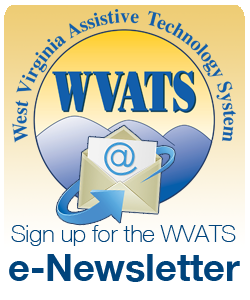Summer 2018
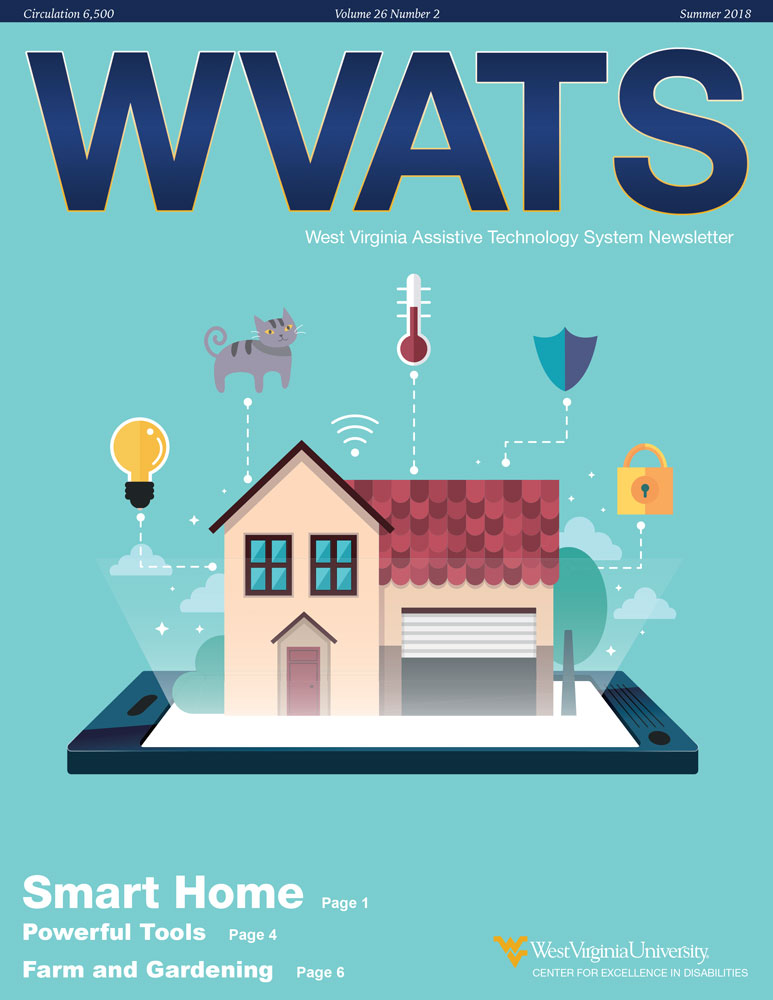
Download a PDF of this Newsletter
Articles:
- Smart home devices make life easier
- WVABLE Accounts
- Powerful Tools
- Farm and Garden
- Variety, a PA resource for WV
Smart home devices make life easier
Smart home devices offer an affordable way for people to increase independence in their homes. People can control their home with their voice or smartphone. These devices can increase access, comfort and security in the home. Smartphones and systems such as Amazon Echo and Google Home allow people to build smart home abilities a little at a time. Users can start with areas or tasks they need to increase independence. Over time, additional pieces can be added to these systems.
Here are some smart home items that could help increase home accessibility:
-
Automated Personal Assistants
These devices allow the user to manage devices connected to the system with their voice. They can also be controlled using a smartphone app while on the go. These devices can be used to set alarms, reminders, timers, lists, make phone calls, play music, find out the news and weather, complete internet searches and many more tasks.
-
Smart Lock
A smart lock can be an alternative to a keypad lock for a home. They may be useful if caretakers, housekeepers, nurses, or therapists need access to the home. Smart locks use the user’s smartphone as a key. Others can be provided temporary, guest, or administrative access to the home. Smart locks can also restrict the times guests can access the home. The apps can monitor and track who enters the home and when. The Schlage Sense Smart Deadbolt, Kwikset Smart Lock and August Smart Lock are a few examples of smart locks.
-
Smart Doorbell
A smart doorbell has a motion sensor camera. Using the companion app on a smartphone or tablet, the user can see who is at the door. Smart doorbells also have 2-way talking capabilities. This feature allows the user to talk to the visitor even when they are away from the home. A smart doorbell may be helpful to those who are unable to see out of their windows from wheelchairs or who have limited mobility. The Ring Smart Doorbell and Zmodo’s Greet Smart Doorbell are a couple of options available.
-
Smart Thermostat
Smart thermostats allow users to keep the home at a preferred temperature. The thermostat learns temperature preferences over time. It will automatically maintain preferred temperatures. The user can change the temperature using their smartphone even when away from home. Smart thermostats can give information about temperature, humidity, and light to allow better use of the system. There are varieties of smart thermostats available including Ecobee, Nest and Honeywell.
-
Smart Lighting and Outlets
Smart lighting can help reduce the risk of low visibility in a home and increase accessibility. A smart light bulb such as Phillips Hue or a smart plug can allow lights to come on with a touch of a phone screen or a voice command. There are varieties of smart light bulbs that can function beyond “on” and “off.” Some allow the user to change colors or dim the lights to reduce sensory overload. Smart plugs can also be used to control other devices and appliances such as fans or electric blankets.
For more information on how to increase home accessibility using smart home devices, contact WVATS at 800-841-8436.
WVABLE Accounts

WVABLE is a program to give people with disabilities more independence and financial security. The program allows people to save and invest money without losing eligibility for certain public benefit programs. Earnings in the account are usually not subject to federal income tax.
These accounts are considered investment accounts. The money can be used on qualified disability expenses. Examples of qualified expenses include housing, transportation, education, health related and assistive technology. Up to $15,000 a year can be saved in a WVABLE account without losing federal aid such as Medicaid or Supplemental Security Income (SSI).
The accounts come with a STABLE card that can be used to spend money on expenses similar to a checking account while also functioning like an investment account.
To be eligible a person must:
- Have developed their disability before the age of 26
- Have been living with their disability for at least one year
- Expect the disability to last for at least a year
To learn more, or to sign up for an account, visit wvable.com.
Effective communication: Healthcare providers and hearing impairments
Are you deaf or hard of hearing? Do you have effective communication with your health care providers?
Title III of the Americans with Disabilities Act (ADA) requires health care providers to make sure communication with people with hearing disabilities is as effective as their communications with people without disabilities. To do this, health care providers must provide auxiliary aids and services unless doing so would cause an undue burden to the facility or fundamentally alter the service being provided. Although handwritten notes or typed text can be an appropriate auxiliary aid for simple communications, in complex health carerelated communications, qualified sign language interpretation may be required. The individual with a disability cannot be charged extra for the cost of an interpreter or other auxiliary aid.
Disability Rights of West Virginia (DRWV) is the federally mandated protection and advocacy system for people with disabilities in West Virginia. If you have experienced problems accessing effective communication, and would like DRWV’s assistance, call DRWV at 800-950-5250 and request an intake. You may also email DRWV at contact@drofwv.org or visit us online at drofwv.org.
(Content provided by Disability Rights of WV)
Powerful Tools
WVATS offers many environmental controls for loan or demonstration. Below are a few items offered through the WVATS loan library. Call WVATS to find out more about the loan library program.
The Amazon Echo and Dot

The Amazon Echo and Dot offer hands-free, voice-controls that can be useful to people in many situations. These devices can interact with other home devices to allow for easy control. Once setup an Echo can make voice activated calls and text messages. The devices can read news from around the world and report on local sports scores. They can be used as memory aids by setting reminder alarms. The Echo can be connected with headphones for personal use as well. The Echo and Dot must be connected to the internet for features to work.
For more information, visit amazon.com/echo.
TP-Link Smart LED Light Bulb
TP-Link Smart LED Light Bulb can be controlled from anywhere. This smart light bulb is installed just as a standard light bulb. When connected to the home internet through Wi- Fi, the light is controlled by the free Kasa app. The Kasa app also allows the user to manage brightness and timers for the lights with a smartphone or tablet. Voice controls can be setup when paired with Amazon Echo or Google Assistant. For more information, visit tp-link.com.
Woods Remote Controlled Outlet Plug-ins
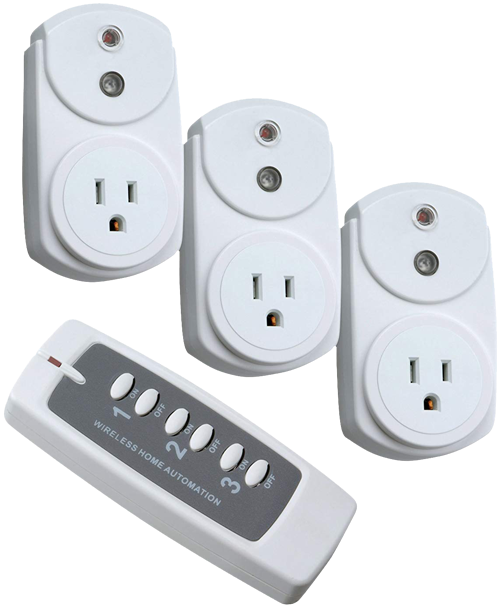
Woods Remote Controlled Outlet Plug-ins come in a three pack of outlet plug-ins and one remote control. The remote will turn the outlets on and off from a distance of 66 feet, even through walls. This device may be useful for someone with limited mobility or for appliances that are out of reach. The setup requires no tools.
Ring Video Doorbell
Ring Video Doorbell allows the user to see anyone approaching the door on a phone or tablet. This provides both security and convenience. The doorbell uses built in motion sensors to send an alert to any device through a free app. The app allows the user and the visitor to talk through the system. The Ring Video Doorbell can be wired to a current doorbell system. For more information, visit ring.com.
Samsung Smart Things Hub
Having a Samsung Smart Things Hub in the home allows users to connect smart locks, lights, outlets and thermostats together in one place. The hub can send important notifications about what is happening in and around the home on a smartphone or tablet. The user can control the home’s security, energy usage and lighting devices all through a single app. For more information, visit shop.smartthings.com.
Farm and Garden
Poultry - an accessible start to farming

Poultry farming can be a sustainable income for farmers with the added bonus of not being physically demanding. When compared to cattle or even vegetables, poultry farming can involve people of all ages and abilities. Poultry production can employ a lot of technology in its chores, even for a backyard farmer. Assistive technology devices and the small lightweight frame of poultry present a good opportunity for all farmers.
Adding automation to a chicken coop makes it easier to care for the chickens. Having an automated door to the coop will save the farmer from getting up at dawn to open the coop and closing it off from predators at dusk. Many doors on the market use a timer for specific times of the day or a sensor to recognize night. Chickens produce the most eggs when they get 15 to 16 hours of light a day. When the days are shorter, having a light on a timer saves on making numerous trips to the coop.
Installing a thermostat and ventilation system for the chickens will save time and money. Also, keeping the moisture in the coop to a minimum helps bedding last longer and keeps chickens healthier. The thermostat monitors the changing weather and keeps the inside cozy for the chickens to maintain optimal laying conditions. To keep a closer eye on the chickens, install a wireless camera that can broadcast to a smartphone or computer. This can also be used to see which chickens are producing the most.
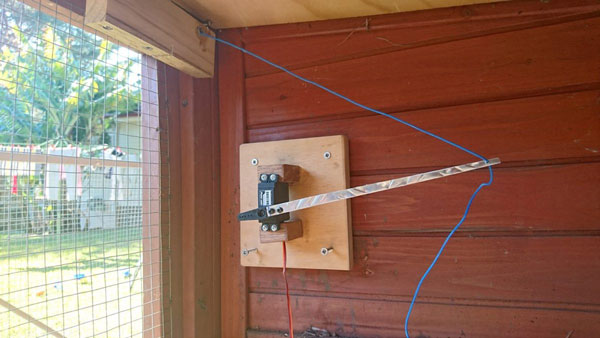
Vertical-Growing Summer
Summer is the perfect time to start an accessible garden. Gardening vertically saves space and eliminates constantly bending over. Using a trellis or a mesh fence allows plants that have vines to grow up. Cucumbers, snap peas and pole beans are examples of vegetables that do well in a vertical garden.
The care for a vertical garden is the same as a traditional garden. The plants will still need watering and pruning. Attaching a drip hose to the structure will allow plants to be watered without carrying water. Picking the vegetables will also be much easier. Vegetables can be seen at eye level and kneeling will not be needed.
Vertical gardening offers a space saving opportunity for those in urban settings. Plants can grow on a patio or porch close to the house in a more convenient location. Make sure the plant’s growth and weight match the material of structure used to avoid collapses. For more information on poultry farming or vertical gardening, call WV AgrAbility 888-858-1694.
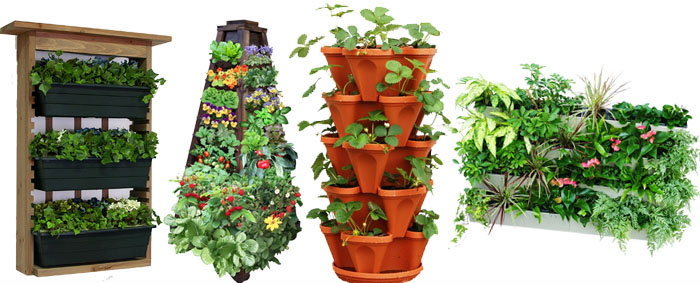
Grandpa’s Automatic Chicken Feeder
Grandpa’s Automatic Chicken Feeder holds up to 10 days of feed for 12 hens. This reduces lifting and hauling of feedbags. The feeder also stops wild birds and rodents from stealing leftover feed by using a pressure plate that closes when a chicken is not on it. Feed is protected from the weather while in the tray, saving money from wasting less feed.
For more information, visit grandpasfeeders.com or call 866-411-3702.
Mighty Mule Automatic Gate Opener
Once installed on a gate, The Mighty Mule Automatic Gate Opener will open with a single button remote. If getting in and out of the vehicle is difficult, a gate opener may help. This device can cut down on the stress to the knees and back while also saving time. Mighty Mule offers openers for many types of gates to fit most setups.
For more information, visit mightymule.com or call 800-543-1236.
Variety, a PA resource for WV

Variety, the Children’s Charity of Pittsburgh, focuses on mobility, communication and social inclusion for children with disabilities. “My Bike” gives adapted bicycles to children with disabilities. “My Stroller” provides an adaptive stroller to kids with disabilities. “My Voice” provides an iPad with a communication app to children with a communication disorder.
All programs are available to eligible children ages 4 - 21 in the following West Virginia counties: Barbour, Brooke, Doddridge, Hancock, Harrison, Marion, Marshall, Monongalia, Ohio, Preston, Taylor, and Wetzel.
For additional information on each program, visit varietypittsburgh.org or call 724-933-0460.

